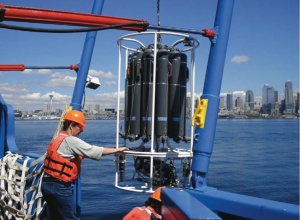Clik here to view.

Sampling Puget Sound waters aboard an EPA ship. Photo courtesy NOAA.
‘Corrosive’ water seen as threat to shellfish
By Summit Voice
SUMMIT COUNTY — A comprehensive, multi-disciplinary survey of Puget Sound suggests that increased concentrations of atmospheric carbon are turning the water more corrosive during certain seasons, with potentially significant impacts to shellfish populations.
The study was conducted by the Puget Sound Ecosystem Monitoring Program, a scientific partnership among universities and government agencies. The report also documented the presence of unusual, harmful algae that can contaminate shellfish, as well as nutrients from human activities, both of which have the potential to degrade water quality.
Conservation advocates say the data is alarming, and suggests that Puget Sound’s wildlife could face persistent threats as the Earth’s climate warms.
“We have to act quickly to stop ocean acidification from unraveling Washington’s ocean ecosystem,” said Miyoko Sakashita, oceans director at the Center for Biological Diversity.
Earlier this year, Washington classified the entire Puget Sound as “waters of concern” because of ocean acidification’s threat to local shellfish and fish resources. Surveys in 2008, 2009, 2010 and 2011 all reported corrosive waters in the Puget Sound that were attributable, in part, to ocean acidification.
The low-pH waters no longer have enough of the material that many shellfish need to build their shells. Such conditions have been linked to oyster die-offs in the Pacific Northwest. Since 2006, shellfish hatcheries in Washington and Oregon have reported massive oyster production failures related to ocean acidification, according to Sakashita.
“Science is showing us that the Pacific Northwest’s coast, and all the ocean life it supports, is in trouble,” she said. “This study suggests Puget Sound may be an early warning system for the future of our oceans. To save coral reefs and shellfish, we need to cut carbon pollution.”
In 2009 the Center for Biological Diversity filed a lawsuit challenging Washington’s prior water-quality assessment for failing to declare coastal waters impaired by ocean acidification. As a result of a settlement of that lawsuit, the U.S. Environmental Protection Agency directed all states to consider ocean acidification as a threat to water quality under the Clean Water Act. The Center has also urged Washington to develop new water-quality standards aimed at detecting ocean acidification.
Each day the world’s oceans absorb 22 million tons of carbon dioxide from the atmosphere, most of which comes from burning fossil fuels and cutting down forests. CO2 reacts with seawater, causing it to become more acidic; as a result the oceans have become about 30 percent more acidic since preindustrial times. Ocean acidification strips seawater of the materials that marine animals — such as corals, plankton and shellfish — use to build their shells and skeletons, which can have repercussions up the entire marine food web. Earlier this year, the Center for Biological Diversity called on the EPA to develop a national plan to address ocean acidification.
For more information, please see EndangeredOceans.org.
Image may be NSFW.
Clik here to view.
 Image may be NSFW.
Image may be NSFW.Clik here to view.
